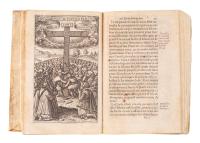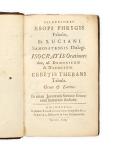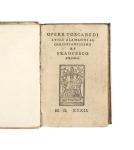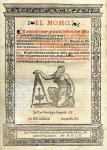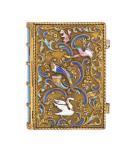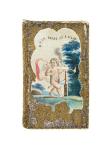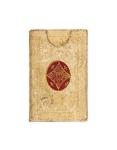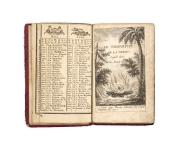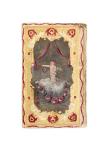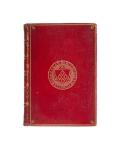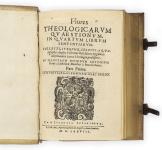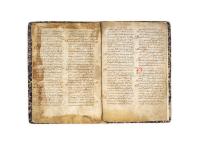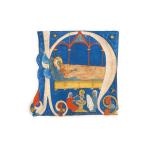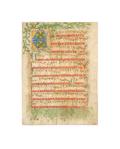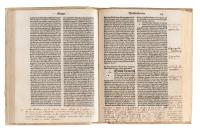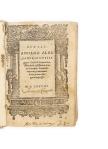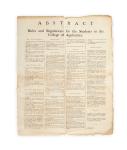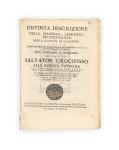Continental
Contact Alex Day, Andrea Mazzocchi, Jonathan Harrison, Charlotte Miller or Sally Deegan
Our Continental department specialises in incunabula, Greek and Latin classics, early vernacular imprints, and notable texts from the Renaissance, the Reformation, and the early modern era, with a specific section devoted to medieval manuscripts, fragments, and illuminations.
We regularly issue lists and catalogues, offering a wide variety of literary, historical, and philosophical books printed in Italy, France, Spain, Germany, Switzerland, the Low Countries, Eastern Europe, and Russia. Woodcuts, early engravings, notable bindings, notable marginalia, rare manuscript or printed survivals, and books with a remarkable provenance are among our keenest interests and feature regularly in our stock.
-
ABBEVILLE, Claude d’.
Histoire de la mission des peres Capucins...
Paris, François Huby, 1614.
Second edition, enlarged and revised from...
£30000
-
ACQUAVIVA, Claudio.
Meditationes in Psalmum XLIV, & CXVIII.
Rome, Bartolomeo Zanetti, 1616.
First edition of these Jesuit meditations...
£1550
-
AESOP, et al. [George STEWART, editor].
Selectiores Aesopi Phrygis fabulae, et...
Edinburgh, Tho. Ruddiman for George Stewart,...
First edition thus, scarce, a Scottish...
£375
-
ALAMANNI, Luigi.
Opere toscane.
[(Colophon:) Florence, [Bernardo Giunta],...
First Florentine edition of this collection...
£650
-
ALBERTI, Leon Battista.
El Momo. La moral e muy graciosa historia...
Alcalá de Henares, Joan Mey Flandro, 1553.
First edition in Spanish of Alberti’s...
£3800
-
[ALMANACK.]
L’Esprit des chansonniers, extrain [sic?]...
Paris, Le Fuel, [1826?].
A very rare enamelled metal binding with...
£2750
-
[ALMANACK.]
Les étrennes à la rose, ou le rosier...
Paris, Janet, [1804?].
A charming literary almanack, or ‘rosebush...
£2500
-
[ALMANACK.]
Étrennes mignones [sic], curieuses et...
Paris, Claude-Jacques-Charles [Durand]...
A very rare Parisian almanack for 1775,...
£1500
-
[ALMANACK.]
London Almanack for the Year of Christ 1785.
[London,] Printed for the Company of Stationers,...
A very attractive miniature London Almanack...
£950
-
[ALMANACK.]
Le triomphe de la vertu. Sujets tirés...
Paris, Janet, [1814].
A very rare biblical almanack for 1814...
£300
-
[ALMANACK.]
Les perfidies supposées ou les médisances...
Paris, Janet, ‘Successeur du Sr...
A seemingly unrecorded almanack for 1800,...
£1450
-
ANACREON.
Ανακρεοντος τηιου μελη...
Parma, [Bodoni] ‘in aedibus Palatinis’,...
Thick paper copy, apparently one of 12...
£650
-
ANGLÉS, José.
Flores theologicarum quaestionum, in quartum...
Rome, Giuseppe de Angelis, 1578.
Scarce second edition (first Cagliari,...
£750
-
ANTIPHONAL,
with neumes, containing antiphons, responses...
Germany, 1st half of 12th century.
Two bifolia from a notably early antiphonal.
£5000
-
[ANTIPHONAL.]
Very large historiated initial ‘H’...
Italy (Siena), c. 1300.
A very fine large initial painted in a...
£6750
-
[ANTIPHONAL.]
Antiphonal, with neumes, containing music...
Southern Germany or Bohemia, mid-fifteenth...
An unusual and striking antiphonal leaf...
£3500
-
ANTONIUS de Vercellis.
Sermones quadragesimales de XII mirabilibus...
Venice, Johannes and Gregorius de Gregoriis,...
A remarkable copy of the first edition...
£8500
-
APPIAN of Alexandria.
Civili. Appiano Alessandrino delle guerre...
Venice, [Pietro Nicolini da Sabbio for...
A much-annotated copy of these late Aldine...
£3000
-
[AQUHORTIES.]
Abstract of the Rules and Regulations for...
Edinburgh, Printed by J. Moir, Paterson’s...
Broadside rules for the newly established...
£850
-
[ARCHCONFRATERNITY OF THE MOST HOLY CRUCIFIX.]
Distinta descrizione della machina, luminari,...
Rome, per il Casaletti, 1775.
Rare record of a procession made by members...
£250
